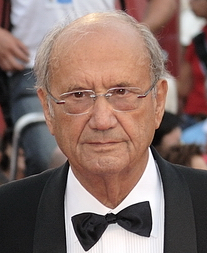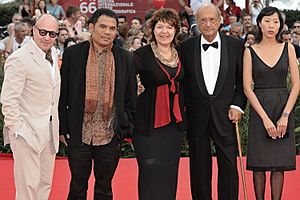Pere Portabella facts for kids
Quick facts for kids
Pere Portabella
|
|
|---|---|
 |
|
| Member of Senate of Spain | |
| In office 15 June 1977 – 1 March 1979 |
|
| Personal details | |
| Born |
Pere Portabella i Ràfols
February 11, 1927 Figueres, Catalonia, Spain |
| Website | pereportabella.com |
Pere Portabella i Ràfols (born in 1927) is a Spanish politician, director, and producer. He is known for his unique and experimental filmmaking style. His movies often explore new ways of telling stories and have a poetic feel, usually with a message about society.
In 1977, Pere Portabella was elected as a Senator in Spain's first democratic elections after a long period of dictatorship. He helped write the Spanish Constitution, which is the main law book for Spain.
Contents
Pere Portabella's Film Journey

Pere Portabella grew up in a wealthy family in Catalonia. He moved to Madrid to study chemistry. There, he met many artists and film students, including famous directors like Carlos Saura.
His first steps into filmmaking happened in 1958. He worked as a producer on a documentary about bullfighting. The film was co-directed by Carlos Saura. After this project, Portabella decided to focus on films that showed the social and political issues of the time.
Starting His Own Production Company
In 1959, Pere Portabella started his own film company called Film 59. This company produced two important films: Los golfos (Thugs, 1960) by Carlos Saura and El cochecito (1960) by Marco Ferreri. These films were inspired by a style called "Italian neorealism," which focused on real-life stories.
In 1960, Los golfos was shown at the Cannes Film Festival. There, Portabella met the famous director Luis Buñuel. He convinced Buñuel to come back to Spain and make the film Viridiana. This movie won the top prize, the Palme d'Or, at the Cannes Film Festival in 1961. It also caused a big stir because it made fun of some symbols of the Spanish state religion.
Exploring New Film Styles
After Viridiana, Portabella worked with other filmmakers. He started to develop a very unique and "radical" way of making movies. This led to his first short film, No contéis con los dedos, in 1968. He also worked with the artist Joan Miró on a series of films.
After the death of the dictator Francisco Franco in 1975, Portabella made a documentary called Informe sobre algunas questiones of general interes para una proyección pública (1976). This film was about Spain's move towards democracy.
In 1990, he directed a fictional movie called Warsaw Bridge. This film explored the connection between books and movies. In 2007, Portabella directed The Silence Before Bach, which looked at the relationship between the music of Johann Sebastian Bach and images. In 2009, he was part of the jury at the 66th Venice Film Festival.
Pere Portabella's Films
Here is a list of some of the films Pere Portabella directed:
- No compteu amb els dits (1967)
- Nocturne 29 (1968)
- Cuadecuc, vampir (1970)
- Umbracle (1970)
- Cantants 72 (1972)
- Acció Santos (1973)
- Advocats laboralistes (1973)
- El Sopar (1974)
- Informe general sobre unas cuestiones de interés para una proyección pública (1977)
- Pont de Varsòvia (1990)
- The Silence Before Bach (2007)
- General Report II: The New Abduction of Europe (2016)
Pere Portabella's Political Role
Pere Portabella was elected as a Senator in 1977. This was a very important time because it was Spain's first democratic elections after many years of dictatorship. He played a part in writing the Spanish Constitution, which is the most important law document in Spain. He has also been a member of the Parliament of Catalonia, which is the regional government in Catalonia.
Since 2001, Pere Portabella has been the president of Fundación Alternativas. This is a Spanish "think tank," which is a group that does research and suggests ideas for public policy.
In 1999, he received the Cross of St. George. This is a high honor given in Catalonia.
See also
 In Spanish: Pere Portabella para niños
In Spanish: Pere Portabella para niños
- Dau al Set
- Joan Brossa
- Carles Santos

